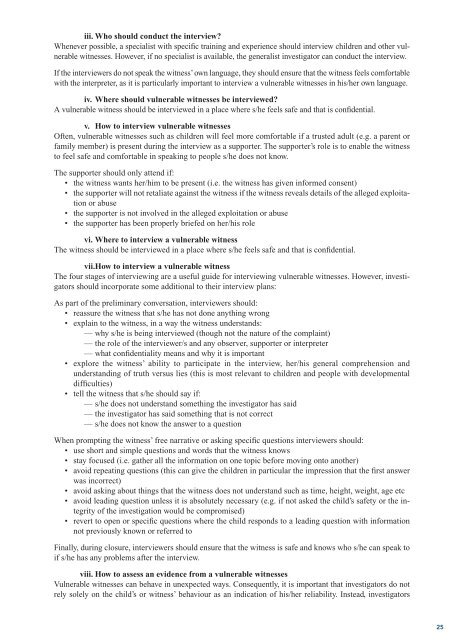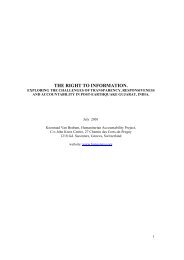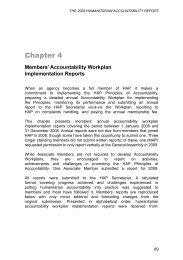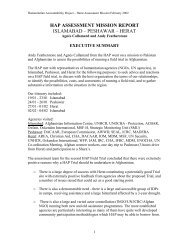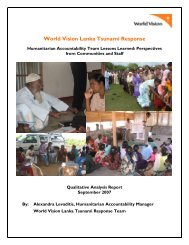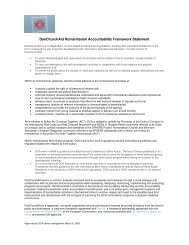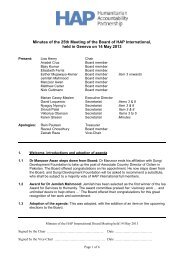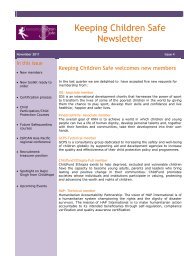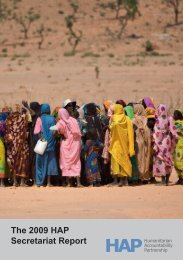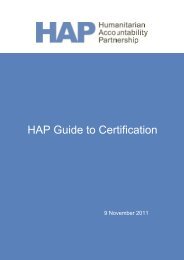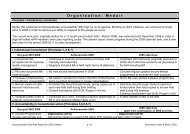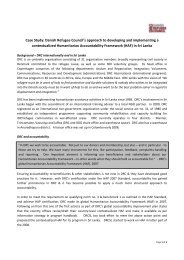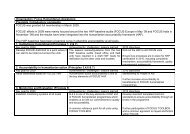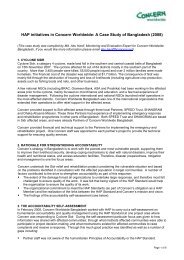Building Safer Organisations Guidelines - HAP International
Building Safer Organisations Guidelines - HAP International
Building Safer Organisations Guidelines - HAP International
Create successful ePaper yourself
Turn your PDF publications into a flip-book with our unique Google optimized e-Paper software.
iii. Who should conduct the interview?<br />
Whenever possible, a specialist with specific training and experience should interview children and other vulnerable<br />
witnesses. However, if no specialist is available, the generalist investigator can conduct the interview.<br />
If the interviewers do not speak the witness’ own language, they should ensure that the witness feels comfortable<br />
with the interpreter, as it is particularly important to interview a vulnerable witnesses in his/her own language.<br />
iv. Where should vulnerable witnesses be interviewed?<br />
A vulnerable witness should be interviewed in a place where s/he feels safe and that is confidential.<br />
v. How to interview vulnerable witnesses<br />
Often, vulnerable witnesses such as children will feel more comfortable if a trusted adult (e.g. a parent or<br />
family member) is present during the interview as a supporter. The supporter’s role is to enable the witness<br />
to feel safe and comfortable in speaking to people s/he does not know.<br />
The supporter should only attend if:<br />
• the witness wants her/him to be present (i.e. the witness has given informed consent)<br />
• the supporter will not retaliate against the witness if the witness reveals details of the alleged exploitation<br />
or abuse<br />
• the supporter is not involved in the alleged exploitation or abuse<br />
• the supporter has been properly briefed on her/his role<br />
vi. Where to interview a vulnerable witness<br />
The witness should be interviewed in a place where s/he feels safe and that is confidential.<br />
vii. How to interview a vulnerable witness<br />
The four stages of interviewing are a useful guide for interviewing vulnerable witnesses. However, investigators<br />
should incorporate some additional to their interview plans:<br />
As part of the preliminary conversation, interviewers should:<br />
• reassure the witness that s/he has not done anything wrong<br />
• explain to the witness, in a way the witness understands:<br />
— why s/he is being interviewed (though not the nature of the complaint)<br />
— the role of the interviewer/s and any observer, supporter or interpreter<br />
— what confidentiality means and why it is important<br />
• explore the witness’ ability to participate in the interview, her/his general comprehension and<br />
understanding of truth versus lies (this is most relevant to children and people with developmental<br />
difficulties)<br />
• tell the witness that s/he should say if:<br />
— s/he does not understand something the investigator has said<br />
— the investigator has said something that is not correct<br />
— s/he does not know the answer to a question<br />
When prompting the witness’ free narrative or asking specific questions interviewers should:<br />
• use short and simple questions and words that the witness knows<br />
• stay focused (i.e. gather all the information on one topic before moving onto another)<br />
• avoid repeating questions (this can give the children in particular the impression that the first answer<br />
was incorrect)<br />
• avoid asking about things that the witness does not understand such as time, height, weight, age etc<br />
• avoid leading question unless it is absolutely necessary (e.g. if not asked the child’s safety or the integrity<br />
of the investigation would be compromised)<br />
• revert to open or specific questions where the child responds to a leading question with information<br />
not previously known or referred to<br />
Finally, during closure, interviewers should ensure that the witness is safe and knows who s/he can speak to<br />
if s/he has any problems after the interview.<br />
viii. How to assess an evidence from a vulnerable witnesses<br />
Vulnerable witnesses can behave in unexpected ways. Consequently, it is important that investigators do not<br />
rely solely on the child’s or witness’ behaviour as an indication of his/her reliability. Instead, investigators<br />
25


